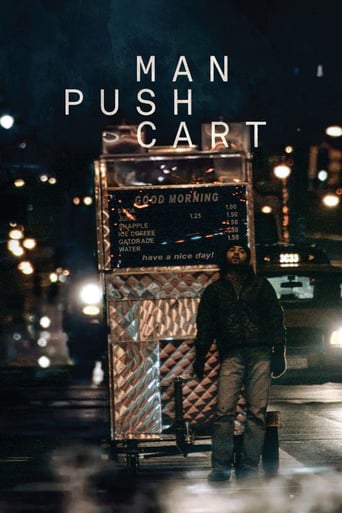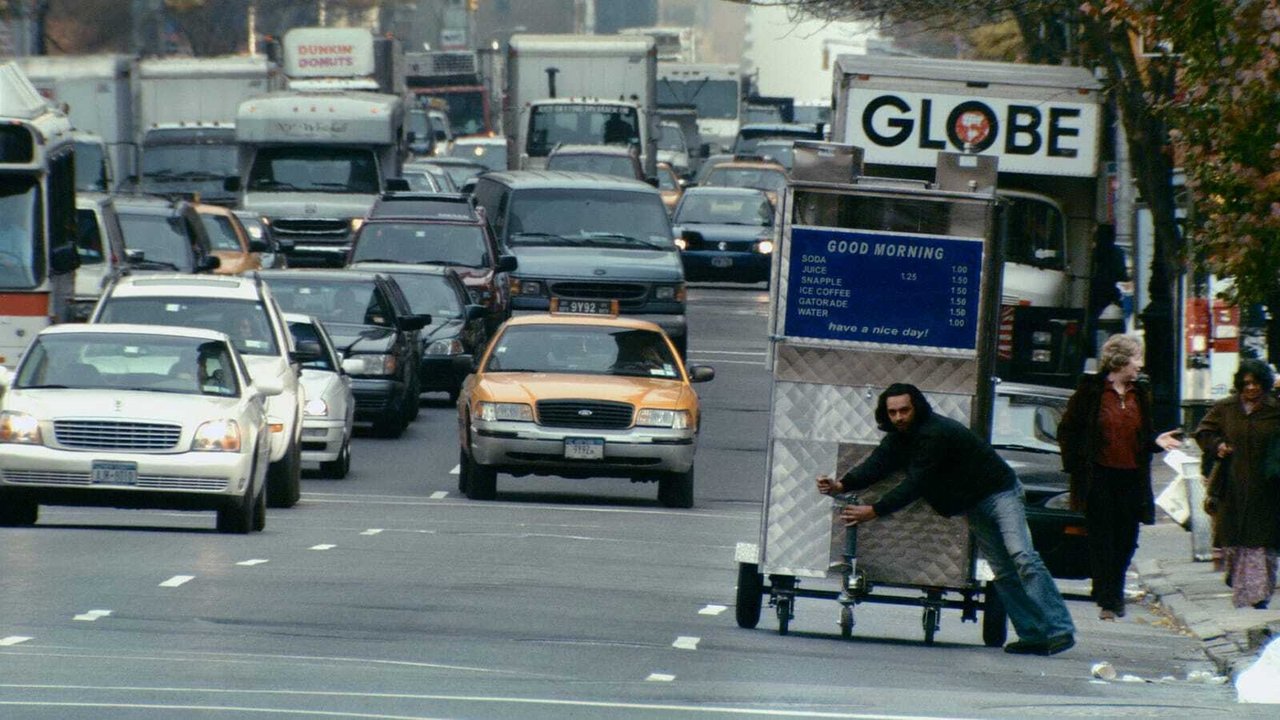Asif Khan (asifahsankhan)
"Man Push Cart" is an extraordinary film by two Half-Americans- One born in that other Iran (Winston-Salem) is the Director Ramin Bahrani (his feature film debut) and the other, is the Film's Producer and the Lead Actor, Ahmed Rizvi who was born in Pakistan. The joint-venture embodies the very soul of Italian Neo-realism, free of contrived melodrama and phoney suspense, it ennobles the hard work by which its hero earns his daily bread. He owns a stainless steel bagel wagon, which he pushes through the lonely Pre-dawn streets. He sells bagels and sweet rolls and juice and coffee and many customers call him by his first name although they would never think to ask his last one.A modern-day Sisyphus, Ahmad (Ahmad Razvi) finds himself condemned by tragedy to spend his days and nights alone pulling his coffee and Donut cart through New York City's bustling streets, his load a symbol of his inescapable sorrow. Writer-director Ramin Bahrani's film debut follows its forlorn protagonist—a former Rock Star known in his native Pakistan as "the Bono of Lahore"—through his gruelling dawn- to-dusk routine of lugging his stand and propane tank to and from his proscribed city corner, stacking muffins and prepping paper cups with teabags, trying to sell bootleg porn DVDs in his free time, and occasionally venturing out to nightclubs with his Westernized Pakistani friends.Like that daily grind, his story of salvation sought and never attained is one of listless, bloodless tedium. Bahrani's portrait of existential urban malaise posits a world in which Ahmad's interpersonal interactions lead merely to further humiliation and misery, whether it be his Sociology or economically tense dealings with a Pakistani businessman (Charles Daniel Sandoval), his communication with the accusatory mother-in-law who won't let him see his son, or his awkward relationship with Spanish newsstand vendor Noemi (Leticia Dolera) to whom he's incapable of expressing his tentative romantic feelings. Its fatalism heightened by its moody depiction of midtown Manhattan as a place of cheerless nocturnal shadows and condescending daylight faces, the film occasionally alleviates its pessimism with brief moments of tenderness, such as Ahmad's care for the tiny kitten that serves as a surrogate for his real offspring.Downside: Shot in tight, intimate close-ups, the attending visuals often mirror the oppressive constructiveness of both Ahmad's cart confines and his weighty grief. Yet Man Push Cart's physical cinematographic proximity never elicits the empathy it intends, as its cold, omniscient perspective increasingly becomes akin to that of a scientist clinically watching a rat futilely search for a bite of cheese at the end of a maze. And finally, the filmmaker's laboured attempts to avoid trafficking in hope have the deleterious effect of casting nearly every scene as a disingenuous, pedantic example of the cosmos's callous cruelty.
sharky_55
Man Push Cart has glimpses of that weary, working class struggle that great works from the Italian neorealists or the British kitchen sink realists provided a window to. The cinematographer's style is plain and unadorned; it does not place extra weight or emphasis on any particular shot, but simply observes a man and his method of survival in the greatest and busiest city on earth. The film's title quite literally describes his daily toil; more than once we are presented with Ahmad's task of dragging his breakfast cart through the streets, filmed in mid shot from in front so that he appears to have no apparent destination (here and there are subtle existentialist tones). Such moments are seldom seen in more consumerist-driven, Hollywood cinema - it's simply wasted space, screen time with no apparent purpose, tedious for the audience to sit through. So it must simulate what Ahmad shoulders each morning and each evening too, tedious, back-breaking work for what seems to be very little reward. Ahmad Razvi is Ahmad, in a worn out, laconic performance that hints at his tragic past. He used to be a rock star in Pakistan, he used to have a wife, he used to be able to see and kiss and hold his son every day. Those are now all gone. Razvi channels his portrayal through the physicalities of his traumas and burdens, crafting an entire weary worldview in his slow trudge through the streets of New York, grappling with the handle of his cart. He speaks only the bare minimum required of him, not because he has been silenced, but because the world has forgotten about him, and to voice this would nothing to change the situation. So he pushes his cart. His backstory demands more meat on the bone than what director Ramin Bahrani offers. In a De Sica-like gut-punch near the end of the film, Ahmad's entire world comes crashing down as he discovers that his cart has been stolen, and races from street to street, frantically searching for the tool that provides his livelihood. There is additional desperation in that the money lost would have gone to finally finding a home where he could be with his son. Yet the boy is ultimately little more than window dressing in the overall narrative, a wisp of a character to boost his motivations. It is a testament to Bicycle Thieves that the act of losing a bicycle could bare a character's soul so nakedly, drive decent men to do desperate things in order to survive. The boy sees what his father has become. Their relationship has been damaged irreparably. But in Ahmad's pleas, his son barely registers a second thought, and the same occurs in the audience's minds. There is also the curious and frustrating romance subplot that Ahmad dabbles in but eventually rejects. He finds his equal in Noemi, who runs a mobile news agency on the same cold streets. But she represents a cutesy ideal at odds with the film's aesthetic, skipping from scene to scene with a waifish frame but round, shining saucers for eyes. Her intentions are oddly upfront; she flashes desire in her every look towards Ahmad, hoping he might take that courageous leap, grab his redemption and swing it around in his arms, planting kisses all over. She is a fairly obvious and frequent character in these films, pretty little things designed to lift up and stroke the egos of crestfallen male protagonists. Resigned to losing his cart, Ahmad's one final plea is to his businessman friend for a loan of $5000. The friend refuses, instead spitting Ahmad's failures and lack of commitment back at him. He snaps - he strikes his friend, then scurries away in shame of what he has done. The moment could have been the film's Bicycle Thieves climax, where Antonio Ricci discards his dignity and decides to steal what has been stolen from him to make a living for his family. But the slap rings hollow. A better film would allow us to understand the emotion behind the hit; how he has lost his chance to be with his son, how he has rejected the only one who cares for him, how he has been stripped of the one possession that he could call his in these troubled times. He has lost everything in that one slap, so why does it not resonate louder?
MajorFilmFan
With "Man Push Cart", Ramin Bahrani crafts a truly unusual and haunting tale. This is the story of a former Pakistani musician who now lives in New York and works a push cart. His life is mundane,and relies basically around his job. When he meets a fellow Pakistani, who recognizes him, he begins to open up to him. He also starts a strange, quiet relationship with a woman who also mans a push cart. But, slowly, his life begin to fall apart.This film is not for everyone, but, for those who like offbeat, strange, and quiet films, "Man Push Cart" offers an unusual look at human life, and loneliness, as well as living in the past, and establishes Bahrani as one of the more underrated directors working today.
Khemaluck Deeprawat
Watching a movie without a real plot can be difficult for me sometimes, but not with "Man Push Cart". I think this film is an art. It gives us a chance to look closer into a life of a seller on the street, to absorb his experience, and feel his deep loneliness.I don't know how the director did it, but these small details of a man's life: daily conversations with customers, pulling a heavy cart alone on the street of a big city, taking a kitten home and trying to keep her in a little box, etc. can communicate so much. Ahmad's deeply sad eyes and humble personality make me feel sorry for him, especially when you see him broken-heart because of love and friendship found and lost. The character is so real. I feel like I get a chance to know him. This movie doesn't have much of a plot but it does have a point and can inspire good things in the viewer. Some thoughts stay with me after the movie was over. Small greeting or simple kindness, even from strangers, can mean so much to a person. There are people living around us who have much more difficult life and if we can look a little closer and care a little more, this world can be a better place.After seeing Ahmad pushing his cart and living his life, I feel that the difficulty in my life is trivial comparing to many people on earth. After I finish watching the movie, I went back to my work without complaining how boring or tiring it was.


 AD
AD




